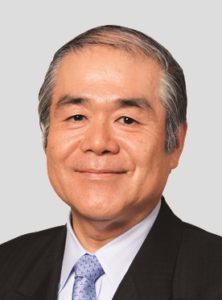Since graduating with a degree in Engineering in Applied Chemistry from the University of Tokyo in 1972, Mr Muraki has been involved in Japan's Gas industry for more than 44 years. He has been involved in international business including the procurement of natural gases for more than 20 years. He was appointed Executive Vice President of Tokyo Gas in 2010 and Vice Chairman in 2014 and since retiring last year, is currently serving as Executive Advisor, as well working for the Japanese government.
What do your roles entail?
As Vice Chair it is my role to represent, support and expand the Pacific and South East Asia networks through high level activities within the region. I am also a member of the finance committee. In my current role as Executive Advisor at Tokyo Gas, I am in charge of the international operations in particular, South East Asian countries, as well as working on a research and development programme on hydrogen related technologies for the government.
What do you see as the key priorities for the World Energy Council in the next three years?
I see addressing the energy trilemma as being the key priority for the council. The relationship between energy and the environment will be one of the defining issues of the 21st Century. Climate change has led to growing calls for action to be taken to halt it. The most recent major effort was last year's global Climate Change Conference in Paris. There, world leaders agreed to reduce emissions to stop global temperatures rising by 2 degrees centigrade, it is an ambitious target given current trends…It will not be easy.
We need to identify what kind of scenarios and what kind of changes will occur in the future, and not just in the next 10 years. The Council is in the process of creating energy scenarios to 2060, which will be presented at Congress. We need to focus on the long term changes and then think carefully how we can go about doing this, step by step. I believe this is the right approach the Council must take.
How do you see the World Energy Council playing a part in addressing the challenges?
The Council plays an important role in acting as platform for dialogue between policymakers, the private sector and international organisations and should continue to keep doing so if we are to successfully address the challenges facing the energy trilemma.
What success stories have there been within the Asian energy sector?
I have been in the energy business in Japan and Asia for a long time, but this is the first time I have covered the whole of the Asia Pacific and South East Asia region as a Vice Chair. I actually think the success stories are happening within the realm of the Council. A lot of good work is done by the committed member committees who contribute their time to the energy cause.
The various member committees within the region are making strides to address issues high on the energy agenda through conferences such as the World Energy Leaders’ Summit (WELS), in the Philippines last year as well as various other regional meetings and activities. However, we need more companies, particularly Asian businesses to get involved in the Council’s activities. We will be working towards better defining the Asia Pacific vision on energy.
What challenges do you see facing the energy sector and the World Energy Council member committees in the Asia Pacific and South Asia regions?
Asia is a huge continent, with countries within this region each possessing different characteristics and economic structures, you have New Zealand and Australia, South East Asia, South Asia and North East Asia. How do we create good programs specific to each region which also complements each other, The Asian Pacific is a growing market within the energy sector. I see this region playing a hugely important role within the energy arena in the future but we need to take into account the above mentioned factor.
What outcomes do you hope Congress delivers?
The energy sector is very interesting right now and is going through a transition with the ongoing volatile oil prices, the technological and electrical revolution we see taking place as well as climate change and the commitments made at COP 21 as a result. Congress will be a perfect platform to come together and discuss various issues which are quite complex. Because of these complexities it is even more important to have discussions and dialogues with policymakers, governments and industry to hopefully cement realistic outcomes and determine which direction the Council will take going forward.






